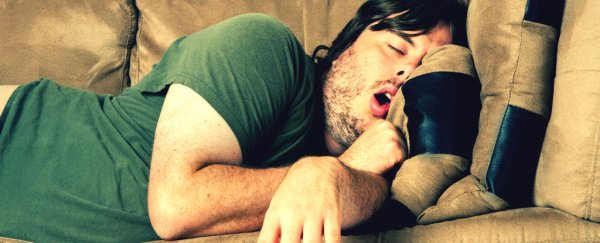Being poked in the ribs from the other side of the bed is never fun, particularly considering the fact that nobody chooses to snore - it just happens. As we sleep, muscle tone relaxes throughout the body, including the upper airways. If there's any sort of obstruction or narrowing up there, the flow of air results in rumbling vibrations of the soft tissue at the back of the throat.
Obstructions of the snore-inducing kind can be various - a really common one is obesity, because there's extra fat on the neck, weighing down the relaxed throat muscles during sleep and narrowing the airways. If you've ever had a flatmate who sounds like a chainsaw after a big night out, you already know that alcohol is a fairly typical cause of snoring, too - this is because alcohol is a relaxant, and a more relaxed throat results in louder snores.
Other problems that lead to snoring include nasal congestion due to a cold or allergies; swollen tonsils; or possibly anatomical problems, such as a bent nostril (typically from a broken nose), or enlarged tongue, or even adenoids. Some people try to avoid sleeping on their back because snoring appears to get worse - this is because the tongue falls back and compresses the airways.
Whatever the cause of snoring, it's not a disease in itself - but it's definitely a symptom of something. "When you are snoring, you're spending too much energy to breathe," sleep expert M. Safwan Badr told Sarah Klein at Huffington Post. "Snoring is like fever for a general internist - it tells you something is going on, but it doesn't tell you what."
That's why the general advice is to go see your doctor if snoring is bothering you - or more likely the other people living under the same roof. For overweight people the first advice is to try and drop a few pounds, because even moderate weight loss can reduce the thunderous vibrations.
If you snore only while on your back, so-called positional therapy can help - it doesn't do away with snoring, but instead helps position your body at night so that sleeping on your back isn't an option. A common version of this type of therapy is a simple tennis ball sown into the back of your pyjamas. There are also vibrating devices that you can strap to you body - neck or chest - which claim to train you in sleeping on your side.
Nasal strips that are supposed to prop your nostrils open are a common anti-snoring device peddled in pharmacies. But, according to Badr, these don't tend to work, because the obstruction remains, even if a strip might make the snoring quieter. "They may or may not affect the acoustics," says Badr, "but not the mechanics of the airway."
There are other devices that can help, but you need to know the exact cause of your snoring before investing in something more invasive. "Oral appliances and nasal continuous positive airway pressure (nCPAP) devices are mechanical apparatuses that act to prevent the tongue and soft palate from collapsing back into the upper airway," writes sleep specialist Lynn D'Andrea at Scientific American.
One thing is clear, though - if snoring is an issue, you should certainly raise it with your doctor, because it might be an indication of something more serious, such as the disorder called obstructive sleep apnoea. And with so many treatment options out there, there's little excuse to not try and tackle the snores.
